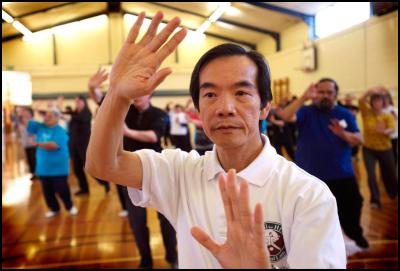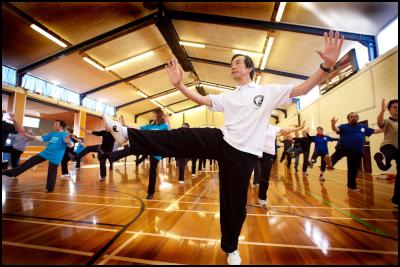Tai Chi For Diabetes In Wellington
September 3 2008
International Tai Chi Master Demonstrated Tai Chi For Diabetes In Wellington Weekend Workshop

Internationally renowned tai chi master, Dr Paul Lam, demonstrated his techniques for using the ancient exercise to help manage diabetes to a large group of tai chi instructors in Wellington at the weekend.
Nearly 50 tai chi instructors from around New Zealand gathered in the city for the two day workshop. More than half the group were instructors who already teach the modified tai chi classes ACC funds to prevent falls in older people. Those classes were devised by Dr Lam.
ACC funds more than 6500 older New Zealanders through the 20 week course each year, because research has shown practising tai chi can greatly reduce an older person’s risk of falling.
``The workshop was fantastic,’’ said Ann Rose, ACC’s falls prevention programme manager, who also participated in the workshop. ``We all learned so much and I’m really excited to know the people who go through ACC’s tai chi courses will soon benefit from their instructors’ enhanced skills.’’
Chinese-born Dr Lam, now a general
practitioner living in Australia, has developed a series of
internationally recognised forms of tai chi for health and
disease management. These include tai chi for arthritis and
falls prevention, osteoporosis, diabetes and back
pain.

Using tai chi
for diabetes management, or even to prevent Type 2 diabetes,
is gaining increasing attention because the disease poses a
huge health and economic threat in western countries,
including New Zealand. Dr Lam has just released a book on
the subject with one of Australia’s most eminent diabetes
experts, Dr Pat Phillips.
``Medical studies have shown that gentle exercise can actually help prevent diabetes in 60 percent of those who are predisposed to the disease,’’ Dr Lam said. ``People with diabetes who exercise regularly have better control over their blood-glucose levels and fewer complications such as heart disease and stroke. This specially designed tai chi programme is gentle, easy to learn and enjoyable, and most importantly, it is safe for people with conditions such as diabetes.’’
Since 1998 ACC has funded classes of tai chi that have been modified to be suitable for older New Zealanders who are particularly vulnerable to injuring themselves in a slip, trip or fall. More than 25,000 people have gone through the course.
Falls caused the single greatest number of ACC claims in New Zealand from July 2007 to June 2008. Last year, more than 150 people aged 65 or older died as a result of a fall, and, in total, more than 70,000 in that age-group needed some medical treatment after a fall.
ENDS


 Aotearoa Covid Action: Pharmac Urged To Widen Access To Covid Vaccines
Aotearoa Covid Action: Pharmac Urged To Widen Access To Covid Vaccines Howard Davis: Dick Frizzell’s Hastings & Studio International Revisited In Wellington
Howard Davis: Dick Frizzell’s Hastings & Studio International Revisited In Wellington Heritage New Zealand: New Education Resource On Ōtūmoetai Pā Released
Heritage New Zealand: New Education Resource On Ōtūmoetai Pā Released Bowel Cancer NZ: Broken Promise, Lost Lives - Govt’s Bowel Cancer Screening Pledge 98% Undelivered
Bowel Cancer NZ: Broken Promise, Lost Lives - Govt’s Bowel Cancer Screening Pledge 98% Undelivered NZFC: Apply For The New Zealand Film Commission’s He Kauahi Catalyst
NZFC: Apply For The New Zealand Film Commission’s He Kauahi Catalyst  Organ Donation NZ: Organ And Tissue Donation Helped Save And Improve The Lives Of Hundreds Of People In 2024
Organ Donation NZ: Organ And Tissue Donation Helped Save And Improve The Lives Of Hundreds Of People In 2024